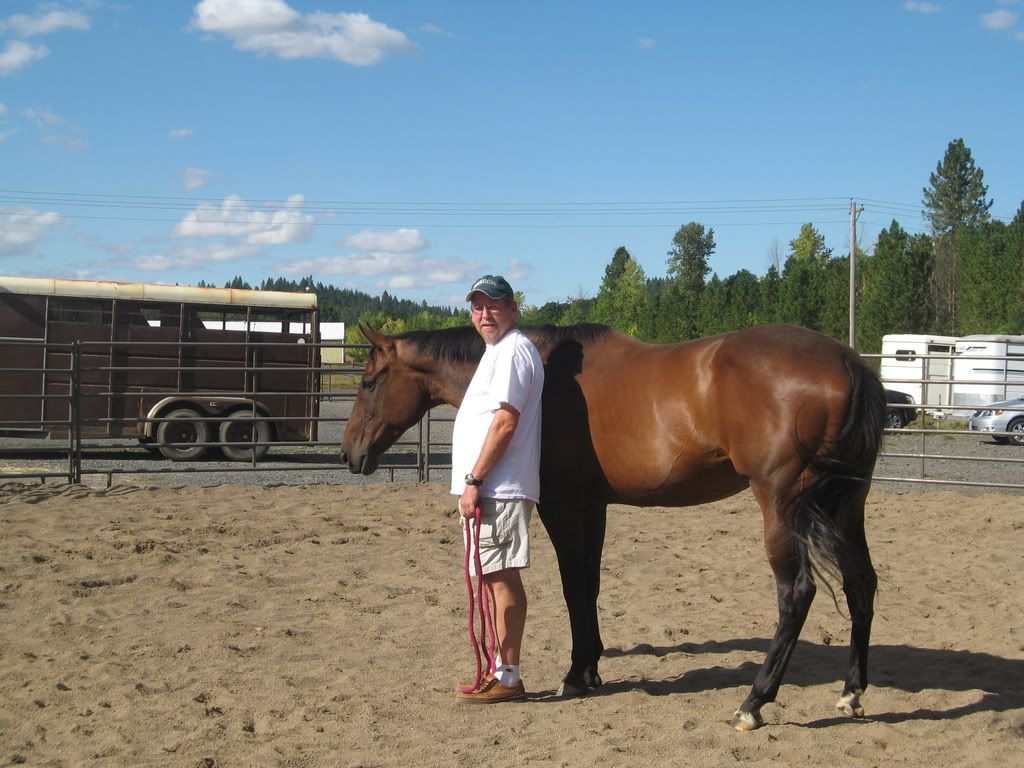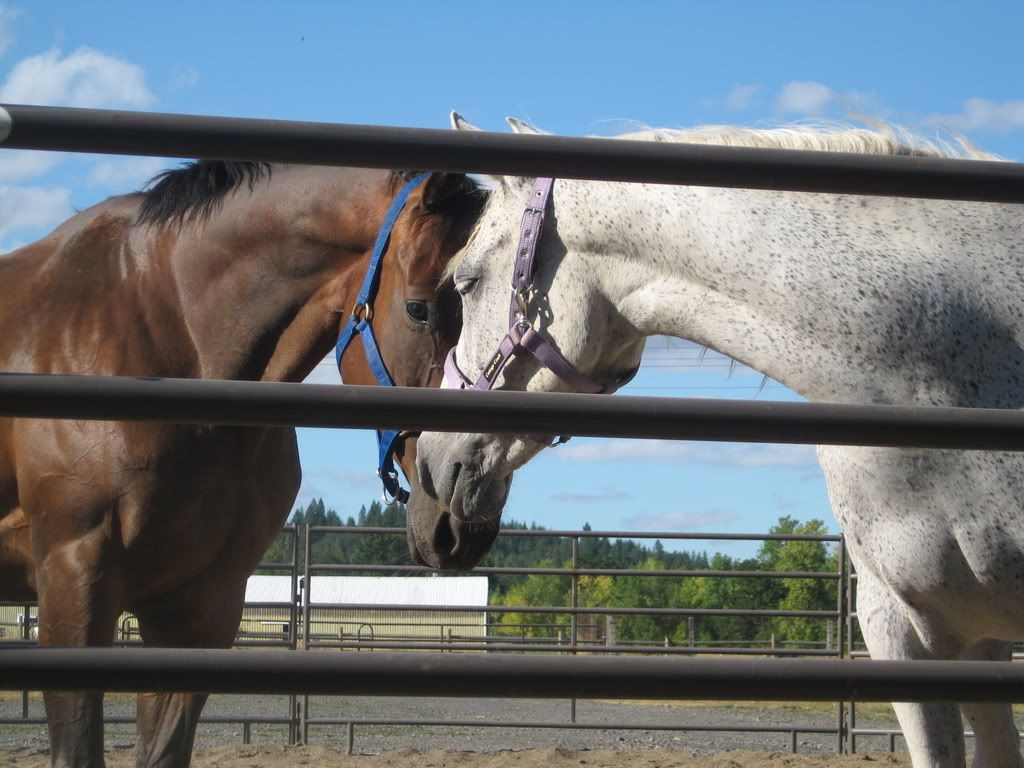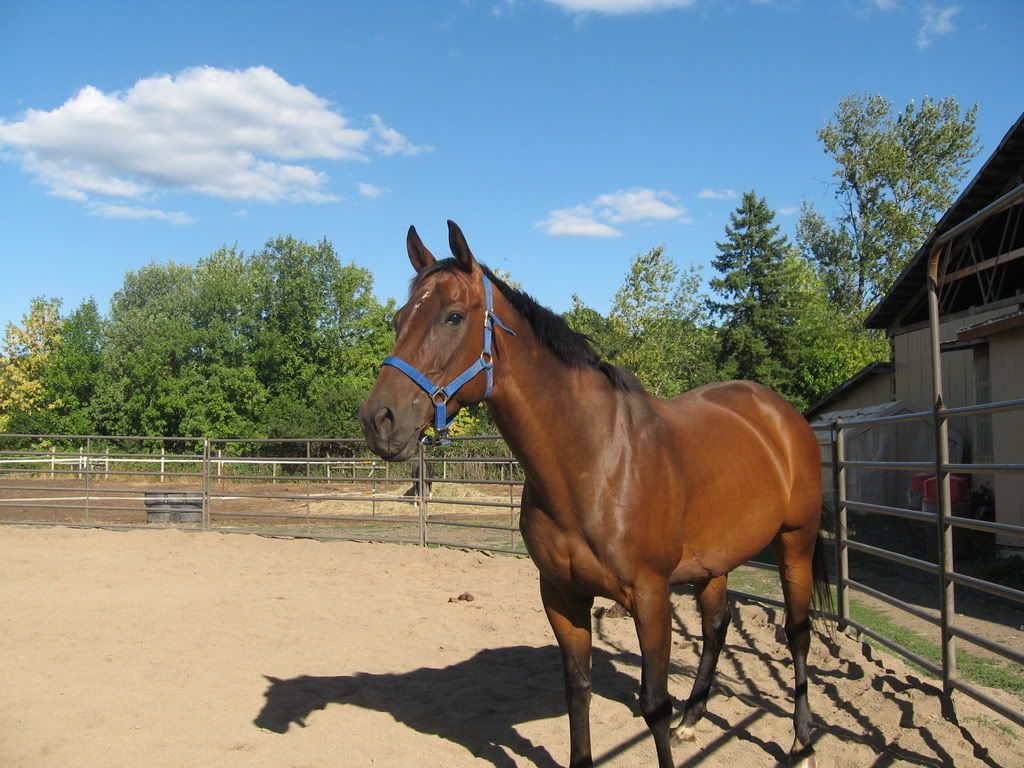Okay, well, so much for willpower.
I got a new pony :)
She's a 6 year old bay Appendix mare, about 15.2 hands. Her previous owner evented her at Novice level. Here's the story (which I of course cannot verify, since I don't know the previous owner): at a Horse Trials, mare freaks out for no apparent reason and goes up and over; then starts going up every time she's mounted. Owner decides she is unpredictable, puts an ad up that says she can go to a good home or the mare's going to OSU for testing for a term and then euthanasia.
The person I bought her from went and picked her up. She's had her for about a month, wherein the mare has shown no indication of any nasty behavior. She's had teeth and feet done and stood very politely for both (though I'm sure she was sedated for the teeth!). Lots of different people have ridden her. She's a little squirrely in the cross-ties and for mounting. She said last night when she went to mount, the mare was more wiggly than usual, so she got aggressive and backed her up to see if it would trigger any rearing, but it did not. She feels that the problem was completely physical, as she had the chiropractor out immediately after picking the mare up, and mare was
really out of whack through the hip, spine, and jaw. She is priced so inexpensively because seller has too many horses (10) and just wants this mare to go to a good situation.
So that's the story. Yes, I was really careful looking at a horse with a history of rearing who is being sold inexpensively. No, I have no intention of buying a dangerous horse or getting myself killed.
I put more value on what I actually see when I go evaluate a horse. So, keeping full mind of her history, my parents and I went to look at this mare (who they call Allie).
First impression: she has a
beautiful Thoroughbred face. I am a sucker for TB faces, having owned one for my first horse. She pokes her head out the stall window, interested to meet us, watching with alert black eyes, so I think it's rather unlikely that she was drugged. She puts her soft muzzle in my hands to smell me, and is a little nervous; she lets me pet her head for a moment before she quickly retreats into her stall and takes another mouthful of hay. She keeps returning to the window to check us out, though -- she's obviously curious.
Once she's out of her stall and cross-tied, I can get a much better look at her. Here's my impression of her conformation (from my limited knowledge, of course). She's got great muscle on her shoulders and haunches; she could stand to gain some weight over her ribs and build up her topline, but she's not underweight by much. She's got a lovely neck that ties in nicely to her body, though she's a bit thick through the throatlatch. Her head is a lovely, refined TB type, with soft eyes, large nostrils, and a calm intelligent expression. She's built relatively even, neither uphill nor downhill. Her forelegs are good, with nice flat knees, solid bone, and good lengths for both cannon bone and pasterns. Her hind legs I can't tell so much -- they seem to be a little upright, but I'm bad at hind legs, and she was never standing quite square. She's got a nice hip angle, and her shoulder angle is nothing to write home about, but it's pretty nice. A nice deep chest and body.
The overall impression: a nice, balanced horse. Built like an athlete with a nice expression.
On to the longe line. She's perfectly polite, if a little reluctant to move out and step under herself at first -- a recurring theme with her. To my eye, she's stiff and tight in her hind end; she found it hard to stretch that inside hind underneath herself all the way. Thankfully, the longer she worked, the more she loosened up. The fact that she had so much wrong with her physically inclines me to think that her muscles are still getting used to their new positions; the way she relaxed and stretched more as she warmed up confirmed that. I feel that with stretching, a slow buildup of work, and a thoughtful warmup, she'll be totally fine.
So then she was ridden by Seller. We got to see the wiggles for mounting, which didn't bother me at all. Why? Well, for one, I've seen worse wiggling from many a horse. For another, she was mounting from the ground, which I can't believe is comfortable for a horse who was so out of alignment earlier. After mounting, she was just fine. Walk trot canter both directions, again observing stiffness that lessened with more work. We saw her jump a small fence from the canter in both directions, which was nice: I got to see that the mare is comfortable adjusting her own distance and making decisions about whether to take a long or short spot. She was very relaxed about it.
Then my mother got on. For those of you that don't know, she's a classic Adult ReRider (or just Rider, since she never had horses when she was young). She's quite capable, and improves every day, but she's not exactly the fearless test-rider that I am, and she's not always super comfortable with her balance. So this was a true test!
Mare was an angel. Walked around calmly, moved nicely off leg (better than McKinna, actually). She'll take up a light contact and stretches down when you give her the reins, which is really nice. Then, Mom picked up a trot. After a minute or so of each trying to understand the other, they had it! Mom just had to get used to a 'big horse' trot again, haha. It was very encouraging to see the mare trot along, relaxed and calm, while my mom figured out her balance. They got a very nice trot going too, further showing her relaxation out of the hind end stiffness.
So that was that! I led the mare around a little on my crutches. She's a very fast learner and very sensitive to what you want -- the first few times I stopped her, she swung all the way around and stopped perpendicular to me. After a couple gentle corrections, she was stopping dead right next to me when I said 'ho.' I can easily see how such an intelligent, sensitive mare could go crazy with heavy handling, so I wonder if that's how she ended up the "unpredictable dangerous horse." I don't know if I ever talked about it, but that's much the same story that came with Chaucer, the big gelding I rode for my trainer. He was sent to auction as a dangerous horse that rears at the drop of a hat and tries to kill you when your back is turned -- all totally untrue with correct handling. He's such a lovebug and a pocket pony, I don't know how you could ever mistake him for a mean horse.
In any case. The mare was physically well-built, she had a kind attitude -- again, the words I'd pick would be sensitive and intelligent -- and she passed the Mom Riding Test with flying colors. We decided to buy her (for the exorbitant sum of $600, because my horses are always
so expensive), and we are going to pick her up either tomorrow or next weekend. I'm very excited!
She's going to be renamed, which is why I've just been calling her 'mare' the whole time. Here's the options, let me know what you think.
Antigone (from a Greek tragedy; pronounced an-TIH-guh-nee). Would probably get called Tig or Tiggy.
Pandora (from Greek mythology; pronounced, well, pan-dore-uh). Would get called all manner of awful things like Panda, Pancake, Pan, Dory, Dora, etc etc etc.
I am
very excited, and I will certainly let you know what she's like when she gets home! Here are some pictures from today to tide you over.

Here's a good shot to show that sweet face, though it's not the best of conformation angles! You can just see one of her hind socks with the adorable black spots in them -- both hind socks have that, and it's really cute.

And a picture of her cantering with the seller riding. You can see she's stepping under herself a bit more here, but I still feel like that will improve with stretching/warmup and strength. She was, however, very willing to do whatever was asked of her. Cantering in a smallish arena was clearly a not the easiest thing in the world for her, but she still did very well.
All in all, I feel that I am very lucky. I found a sweet, willing, and intelligent mare who had been written off as dangerous when she was simply mishandled (or so I believe). The funny thing is that she's honestly the best-trained horse we've ever bought, including the two previous horses we'd bought and the four Rose has bought in her time with horses.
In closing, here's a few amusing similarities between this purchase and my purchase of Bailey --
- Both purchases were made without trainer present. In fact, I haven't told trainer. Will definitely do that, um, soon.
- Both times, I'm on crutches having recently broken an ankle. I mean, seriously?
- Both bays with adorable TB heads, though this one's only half TB.
- Both $600.
- Both a little misunderstood and not that many steps away from a really bad situation.
On the other hand, this mare isn't emaciated, she's not aggressive on the ground or otherwise, and she's nowhere near as green as he was.
I am excited to see what my new mare turns out to be like!
















